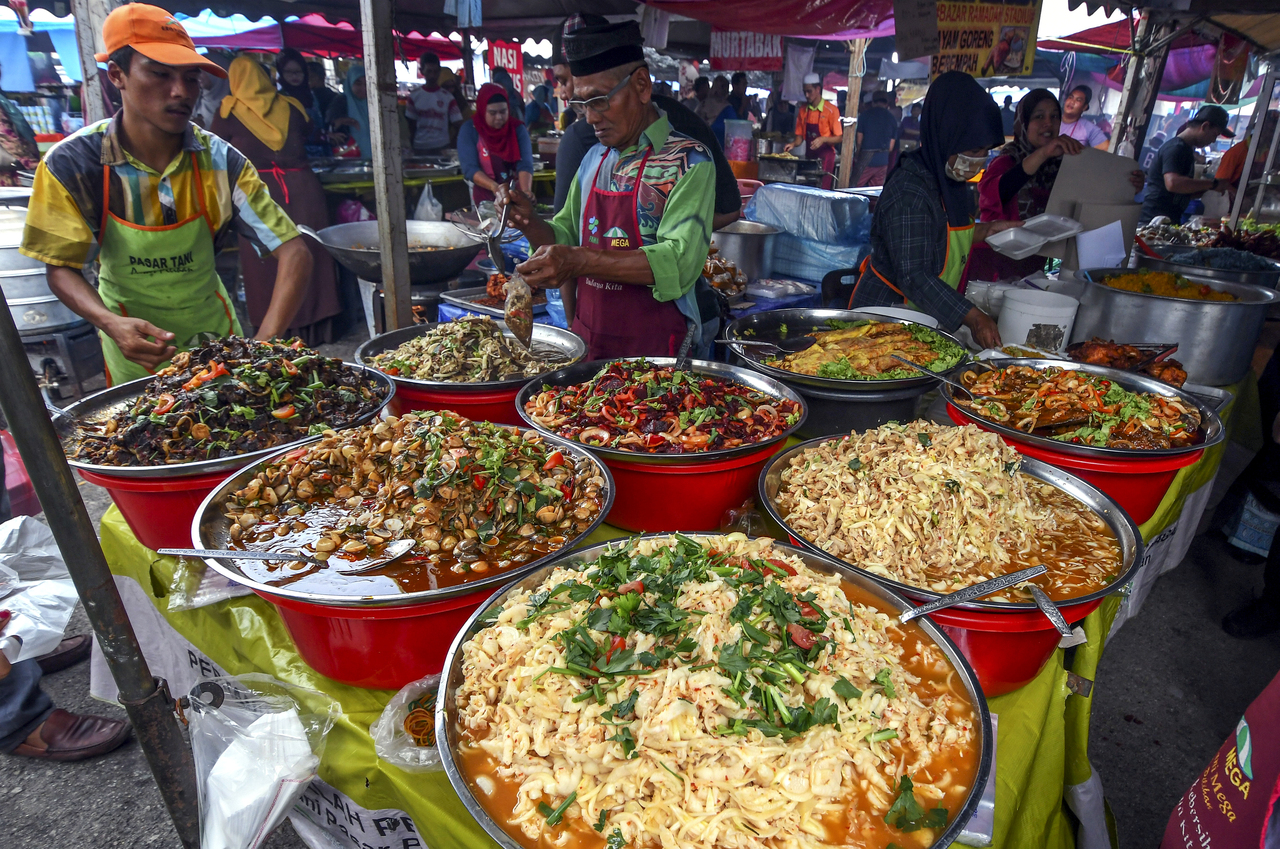Coronavirus: With open-air Ramadan bazaars banned, Malaysia's small traders going online
Sign up now: Get insights on the biggest stories in Malaysia

Five Malaysian states have banned these once-a-year food bazaars for this year.
PHOTO: BERNAMA
KUALA LUMPUR (THE STAR/ASIA NEWS NETWORK) - With some Malaysian states banning the hugely popular Ramadan bazaars amid the coronavirus pandemic, netizens have started social media groups to help small traders sell online, avoiding what they claim are the high commission charges from food-delivery players such as GrabFood.
Five Malaysian states have banned these once-a-year food bazaars in order to curb large crowds from gathering, with more states expected to join soon.
The Health Ministry's director-general Dr Noor Hisham Abdullah said on Friday (April 3) that Malaysia may continue to ban mass gatherings for the rest of the year even after the ongoing movement control order (MCO) is lifted.
Malaysians have begun adapting to new habits during the MCO, and this this could be the new norm in the future.
"Although the national MCO is scheduled to end in two weeks, our practices have changed. It is not normal anymore. We do not shake hands, we frequently wash our hands and we keep our distance.
"The government will probably discourage mass gatherings for the next six months or one year, " he told a news conference.
Meanwhile, graphic designer Amirul Rafiq started a Facebook group called Seremban Online Bazaar Ramadhan 2020, when he heard that there will be no such bazaar in Negeri Sembilan this year.
Mr Amirul said Ramadan bazaar sellers can promote their business through the group and then contact him to arrange for runners for delivery.
"In Seremban, there could be up to 1,000 sellers who usually set up stalls at popular Ramadan bazaar locations. When it was announced that they couldn't do any business this year, a friend who is also a seller asked if we can start setting up a network for runners to help them do delivery," he said when contacted.
The group now has over 7,000 members.
Mr Amirul said the plan now is to help the sellers raise awareness about the dishes they will be offering during Ramadan and get customers interested.
The states of Selangor, Melaka, Negeri Sembilan, Terengganu and Kedah have decided not to organise these bazaars, even as federal Cabinet ministers said they have not made a decision on the matter.
Malaysia is into its 17th day of the 28-day MCO on Friday (April 3), with most businesses shut and the public advised to stay indoors.
The Muslim fasting month starts on April 23 this year, nine days after the last day of Malaysia's MCO on April 14.
The bazaars feature makeshift stalls selling freshly cooked food and beverages, with the stalls set up on closed roads and in open-air carparks all over the country.
They are mostly packed by Malay Muslims looking for food and drinks to break their day-long fast.
Singapore, too, has announced that its Ramadan bazaars - usually held in Geylang Serai and in the void decks of Housing Board blocks in many places - will not be held this year.
Malaysia on Friday said there were 217 new Covid-19 cases, bringing the country's total to 3,333 confirmed infections. There were also three more fatalities in the same 24-hour span, taking the death toll to 53.
For those going online, there could be a steep learning curve for these small traders.
Mr Zamri Mohammed, secretary for confederation of small hawkers and traders Malaysia said: "You have to understand that some people like our Mak Cik Kiah (older women) wouldn't know how to get on social media or engage with delivery platforms to help with their business."
Mr Zamri said some sellers are reluctant to sign up with established delivery platforms like Grab and Foodpanda.
"Some of these platforms could take a commission of up to 35 per cent per delivery. So if you're selling a food item for RM10 (S$3.30), then you only take home RM6.50. So they would rather do it independently," he said.
Terengganu resident Mohd Wan Azenan, who has been selling local specialty nasi ayam tempayan (a local version of chicken rice) since 2012, set up the Bazaar Ramadhan Online Dungun group, with his wife Rozana Manaf on March 31. It now has over 600 members.
"Now we have to do what we can to help people promote their food business for delivery during fasting month," Mr Wan Azenan said.
In Selangor, businessman Arif Ridzuan started two Facebook groups, Bazaar Online Shah Alam Ramadhan 2020 and Bazaar Online Klang Ramadhan 2020.
He wanted to help his friends who are Ramadan bazaar sellers to raise awareness about their potential delivery business before fasting month begins.
"We're helping some sellers now to familiarise themselves with the social media platform and how to engage with the right people to make arrangements for delivery," he said.


